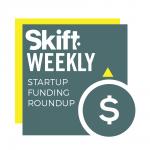Skift Take
This week, investors bet more than $136 million in travel-themed startups, including a robot builder, a video-sharing app, and two companies that make multiple types of transport searchable and bookable.

Travel Startup Funding This Week
Each week we round up travel startups that have recently received or announced funding. Please email Travel Tech Reporter Justin Dawes at [email protected] if you have funding news.
This week, travel startups announced more than $136 million in funding.
>>Omio, the travel booking app, said Wednesday it had raised $100 million (€83.7 million) in convertible debt.
Investors included Temasek, Kinnevik, Goldman Sachs, NEA, and Kleiner Perkins. See Skift’s story.
>>ExcelLand, a robotics company, has received undisclosed investments from hotel groups Huazhu and BTG Homeinns. The financing added to its recent Series B round of about $14.4 million (100 million renminbi).
Other investors include Snowball Capital, Legend Capital, China Merchants Capital, Convivialite Ventures, and Seekdource Capital.
During the pandemic, Huazhu used robots to make more than 200,000 deliveries a month at many of its 6,000 properties. BTG Homeinns oversees 4,450 hotels and sees the strategic investment as a way to scale up its use of robots.
ExcelLand builds contactless distribution robots for many settings, not only for hotels. The company, founded in Shenzhen in 2013 under the name UtiTech, now runs 3,000 robots at more than 1,000 businesses.
For example, food-delivery service Meituan Dianping uses its robots to distribute meals to workers at hundreds of companies on a corporate campus in Shenzhen. The robot can avoid obstacles and take elevators. It can handle 20 meal orders at a time, and it has an ultraviolet light in its compartment aims to keep the storage area disinfected, the company said.
>>Trell, an app where people share videos of their travel and local experiences, has raised $11.4 million in a Series A funding round.
KTB Network, a South Korean company, led the round. Samsung Ventures, Fosun RZ Capital, Firebolt Ventures, and WEH Ventures also took part. Trell has participated in Surge, Sequoia’s startup accelerator.
The Bengaluru-based startup has raised about $17 million in total since its founding in 2016. The company says it has about 26 million monthly active accounts.
>>Trafi, a mobility-as-a-service provider, has raised an undisclosed Series B round.
Sumitomo Corporation and Aioi Nissay Dowa Insurance led the round, estimated at more than $10 million. EBRD and Octopus Investments also took part. Before this investment round, the startup had raised about $14 million.
Trafi, founded in Lithuania in 2007, offers a public transport application that helps users plan journeys using real-time data from global positioning satellites and crowd-sourced reports.
Trafi launched in August a country-wide transport app in Switzerland called Yumuv, with the help of SBB, the Swiss national railway operator.
In Berlin, it powers the Jelbi mobile app, which lets residents and visitors plan and pay for journeys on trains, trams, scooters, bikes, and taxis, thanks to the support of Berlin’s public transport authority.
Skift Cheat Sheet:
We define a startup as a company formed to test and build a repeatable and scalable business model. Few companies meet that definition. The rare ones that do often attract venture capital. Their funding rounds come in waves.
Seed capital is money used to start a business, often led by angel investors and friends or family.
Series A financing is typically drawn from venture capitalists. The round aims to help a startup’s founders make sure that their product is something that customers truly want to buy.
Series B financing is mainly about venture capitalist firms helping a company grow faster. These fundraising rounds can assist in recruiting skilled workers and developing cost-effective marketing.
Series C financing is ordinarily about helping a company expand, such as through acquisitions. In addition to VCs, hedge funds, investment banks, and private equity firms often participate.
Series D, E and beyond These mainly mature businesses and the funding round may help a company prepare to go public or be acquired. A variety of types of private investors might participate.
The Daily Newsletter
Our daily coverage of the global travel industry. Written by editors and analysts from across Skift’s brands.
Have a confidential tip for Skift? Get in touch
Tags: funding, startups, vcroundup
Photo credit: ExcelLand's third-generation robot, designed for use in hotels. The robotics company joined Omio, Trell, and Trafi in disclosing recent venture capital funding rounds in the the travel sector. ExcelLand
